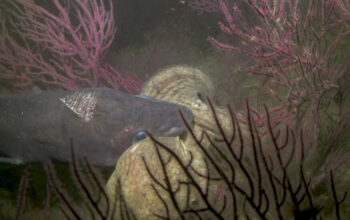
A 65-year-old woman was bitten by a shark Monday afternoon at Rockaway Beach, the authorities said, in what appeared to be the first confirmed shark bite in New York City waters in decades.
The woman, Tatyana Koltunyuk, was bitten on the left leg as she swam near Beach 59th Street, a spokeswoman for the city’s parks department said. Ms. Koltunyuk was swimming alone when lifeguards heard her screaming for help, according to a police report.
Lifeguards removed Ms. Koltunyuk from the water, applied a tourniquet and administered other first aid, and emergency responders then took her to Jamaica Hospital in critical condition. On Tuesday, her condition was listed as “serious but stable,” the police said.
“We hope for a full recovery for this swimmer,” the parks department spokeswoman, Meghan Lalor, said in a statement. “Though this was a frightening event, we want to remind New Yorkers that shark bites in Rockaway are extremely rare.”
The police report indicated that Ms. Koltunyuk had lost about 20 pounds of flesh as a result of the bite, but pictures published online showed that while her wound was serious, that figure was probably a significant overestimate.
Lifeguards ordered everyone out of the water after Ms. Koltunyuk, whom parks officials initially said was 50, was bitten, and helicopter crews searched for sharks without spotting any. The beach was closed for swimming and surfing on Tuesday.
Parks officials and experts said the shark bite was the first at Rockaway Beach “in recent memory.”
“I don’t think in my history, I’ve heard of that kind of injury in our waters, despite the fact that I’ve worked with sharks for 30 years,” said Hans Walters, a field scientist with the Wildlife Conservation Society’s New York Aquarium. “The injury itself is unusual.”
Mr. Walters said the biting should not cause people to abandon their beach-going routines but was a reminder that “our city butts up against the sharks’ home.”
“Sharks are our neighbors,” he said. “They live in our backyard. We have to be aware that they are there.”
There have been 20 unprovoked shark attacks in New York State since 1837, according to the Florida Museum’s International Shark Attack File, a database of all known shark attacks.
The biting on Monday was the first confirmed shark attack in New York City since the 1950s, according to the Global Shark Attack File, an unofficial database of such encounters. The last documented shark bite in the city listed in the database was in 1958, when a man was bitten by a harpooned shark after provoking it.
Gavin Naylor, the program director of the Florida Program for Shark Research, which maintains the International Shark Attack File, noted that bait fish, including bluefish and bunker fish, had become more plentiful in the Long Island region in recent years, and that the water quality appeared to be improving.
“That brings in a lot of animals that belong there that haven’t been there for a while,” he said. “And with that, we get the animals that prey on them.”
“We can expect that as the ecosystem recovers that we’re going to see a bit more of that,” he said, adding that people should learn more about the increased risks of being in the water.
It would be possible, Mr. Naylor said, to identify the type of shark that bit Ms. Koltunyuk once more was known about her injury and the depth of the water where she was swimming.
At midday Tuesday, Beach 59th Street was largely deserted. A police helicopter whirred overhead, and police vehicles moved slowly down the boardwalk, their lights flashing. Red flags prohibiting swimming flapped in the wind along the length of the shore.
Nonetheless, a few beachgoers were making the most of the sunny day.
Nancy Ugalde of Brooklyn was set up on a colorful beach blanket with two relatives. They had planned to swim, she said, and were alarmed to hear that a woman had been bitten by a shark.
Ms. Ugalde, 58, said Beach 59th Street was her favorite stretch of the Rockaways, a quiet area that is secluded from the crowds that gather farther away. She had never heard of a shark attack in her 30 years visiting the beach.
“I’m not going in there today until they say it’s OK to go in,” Ms. Ugalde said. “It’s very scary.”
The last known potential shark bite at Rockaway Beach was in 2017, when a surfer, Michah Behrend, sustained a foot injury that required 40 stitches.
A day after Mr. Behrend was injured, a baby great white shark was spotted near where he had been surfing, Patch.com reported. One expert said Mr. Behrend’s wounds did not appear to be consistent with a shark bite.
Mr. Behrend, 38, said on Tuesday that he had never learned exactly what caused his injury. He said he had surfed at Rockaway as recently as Saturday and had heard about recent shark sightings in the area.
“The water temperatures are warmer than usual — I think that’s been drawing the sharks in,” Mr. Behrend said. He said the sightings and the attack on Monday would not deter him from surfing when the beach reopened.
“I think you just need to be careful when going out at certain times of day,” he said, adding that he loved the ocean and visited the beach every week.
Shark bites have become more common on Long Island lately. There were eight in 2022, and there have been at least five this year. On Tuesday, officials closed a portion of Jones Beach in Nassau County after a possible shark sighting at around 9:30 a.m., said George Gorman, the state parks office’s Long Island regional director.
The entire beach was closed after a second possible sighting a little later, he said; there was a third possible sighting as well. The presence near shore of large pockets and schools of bait fish and bunker fish, which sharks prey on, helped persuade officials that the water was not safe for swimming, Mr. Gorman said.
Because of the biting at Rockaway Beach, Mr. Gorman said, drones that are used to monitor the waters off Jones Beach sporadically on most days operated throughout the day on Tuesday. The devices will scan the surf on Wednesday to ensure that conditions are safe before the beach opens for swimming, he said.
Eliza Fawcett, Chelsia Rose Marcius and Ed Shanahan contributed reporting. Susan C. Beachy contributed research.



